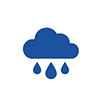Stormwater Management
The Town of Melbourne Beach works towards reducing the amount of excess nutrients that enter the Indian River Lagoon through stormwater runoff.
Stormwater Hotline: (321) 724-5860
 Stormwater runoff occurs when large volumes of rain flow over impervious surfaces—such as streets, parking lots and rooftops—without soaking into the ground. This runoff picks up nutrient rich pollutants that pose threats to nearby waterways like the Indian River Lagoon.
Stormwater runoff occurs when large volumes of rain flow over impervious surfaces—such as streets, parking lots and rooftops—without soaking into the ground. This runoff picks up nutrient rich pollutants that pose threats to nearby waterways like the Indian River Lagoon.
The Challenge
Much of our stormwater runoff flows unfiltered into the Indian River Lagoon, carrying with it fertilizers, pesticides, lawn clippings, pet waste, car oils, sediment, and litter. These excess ‘nutrients’ fuel the excessive growth of algae and accumulation of muck, which smothers natural seagrass, depletes oxygen, and can lead to fish kills and other health concerns.
The Opportunity
Practices involving low-impact development for improved stormwater management can reduce both flooding volumes and environmental impacts. The Town of Melbourne Beach is evaluating and planning for alternatives to conventional stormwater systems, and when feasible, including green infrastructure alternatives.
Read below to learn how the Town of Melbourne Beach intends to protect and restore the surrounding aquatic ecosystems from stormwater pollution.
1. Low-Impact Development (LID)
 Town continues to explore and implement on-site rain water capture techniques such as bioswales, rain gardens, and pervious pavements. The Sunset Avenue bioswale redirects stormwater into a vegetated detention area to remove debris and pollution, thereby improving the quality of the stormwater before it reaches the lagoon.
Town continues to explore and implement on-site rain water capture techniques such as bioswales, rain gardens, and pervious pavements. The Sunset Avenue bioswale redirects stormwater into a vegetated detention area to remove debris and pollution, thereby improving the quality of the stormwater before it reaches the lagoon.
2. Stormwater Infrastructure Management
 Ditch Witch
Ditch Witch
Public Works utilizes their very own Ditch Witch to seasonally remove debris from our stormwater boxes, which are typically filled with grass clippings, leaves, and plastic wrapped newspapers. Read What You Can Do below to help keep our storm drains clean.
 Stormdrain Markers
Stormdrain Markers
In an effort to educate residents that what enters a stormdrain flows into the lagoon, markers were added to most stormdrains along Riverside Drive, Pine Street and many neighborhood side streets throughout Melbourne Beach.
 Swales
Swales
To reduce the amount of nutrient pollutants entering the lagoon, reduce the volume of water flowing through our stormwater system, and reduce flooding in our streets and intersections, the Town has implemented ribbon curbs and swales in high impact areas throughout the community. Swales are shallow ditches dug to direct and slow the flow of stormwater so it can filter into the soil. The Town is also offering a free swale to any Melbourne Beach resident property.
3. Stormwater Nutrient Reduction
Fertilizer
The Town implemented and honors strict fertilizer ordinances, including the summer fertilizer ban (June 1 - September 30), and replaced the use of chemical fertilizers and pesticides with compost throughout Ryckman Park. Not only does this help reduce algae-feeding nutrient pollution from entering our waterways, it protects the health of our children and pets who play in the park.
 Lagoon-friendly Landscaping
Lagoon-friendly Landscaping
The Town maintains numerous public parks with assistance from groups like Melbourne Beach Gardeners. For example, Bicentennial Park features an array of native vegetation that doesn’t require fertilizer, minimizes excess irrigation, and attracts important pollinators to enrich biodiversity.
 Upland Buffers and Living Shorelines
Upland Buffers and Living Shorelines
To ensure our riverfront is healthy and beautiful, the Town worked with Keep Brevard Beautiful to install an upland buffer zone with native plants, and a living shoreline with mangroves along the lagoon-front to filter runoff and provide shelter for small aquatic creatures.
4. Restoration
 Oyster Mats
Oyster Mats
The Town attached oyster mats to the pilings of the Melbourne Beach Pier to create a “Living Dock.” Oysters are tremendous filter feeders—capable of filtering nearly 50 gallons of water per day! This makes them an essential ingredient to improving lagoon water quality.
Oyster Reef
To further water filtering efforts, the Town is working with Brevard Zoo’s Restore Our Shores Program to install an oyster reef along the Ryckman Park Pier.
 Tree Canopy
Tree Canopy
Local nonprofit, Global Sustainability Group, planted 33 Oak Trees along Oak Street to help restore our natural canopy. Trees act as a sponge for rainfall, shelter the soil beneath, and remove nutrient pollution through their complex root systems. Additionally, trees reduce greenhouse gases, provide cooling shade, and offer a home for wildlife.
What Can You Do?
Even if you live miles away from our waterway, choices we make in our yards can affect the water quality in the lagoon.
Looking for fun volunteer opportunities? Join us on Facebook to find the next event!